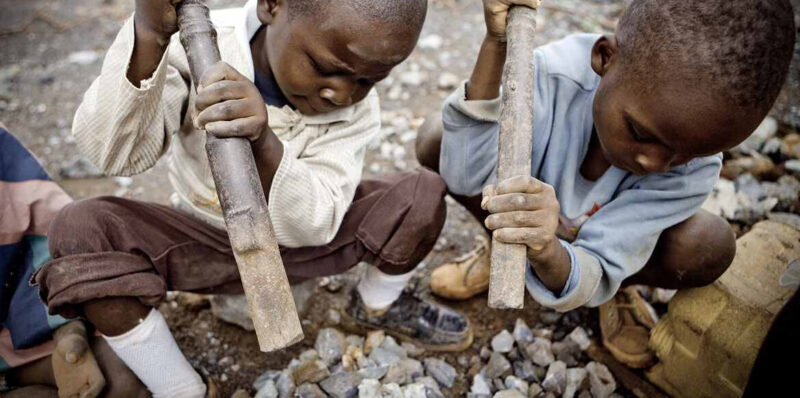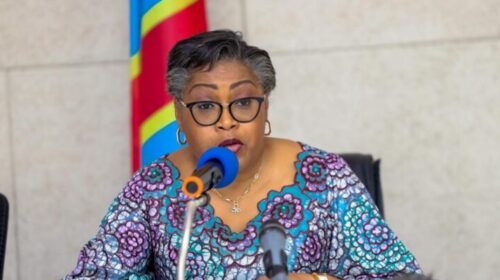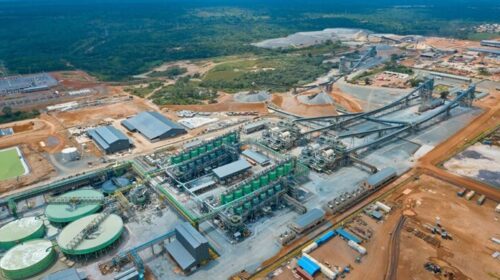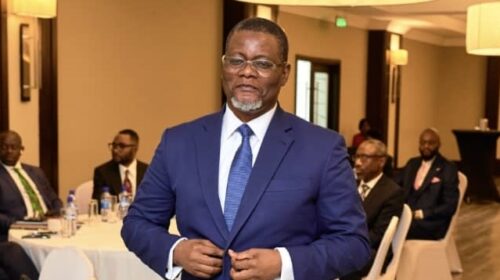Global Battery Alliance intends to raise funds for alternative projects to end child labor in DRC mines
The Minister of Mines, Willy KITOBO SAMSONI, received in audience on Friday in Kinshasa the UNICEF Representative, Édouard Beigbeder, who came with a delegation of 4 people to discuss the actions to be carried out in the field and financed by the members of Global Battery Alliance, reports the Communication Unit of the Ministry of Mines.
The minister’s hosts began by explaining the willingness of members of the Global Battery Alliance to become actively involved in the fight against child labor in artisanal cobalt mines in the DRC. For them, they find it an obligation to get involved in making artisanal cobalt mining responsible; this would avoid the purchase by their members, who are end consumers, of cobalt obtained under conditions where children’s rights are not respected.
Moreover, according to this delegation, Global Battery Alliance has decided to raise funds to finance alternative solutions that would avoid the problem of child labor in mines in the Democratic Republic of the Congo.
In reaction, the Minister of Mines welcomed this initiative, recalling that his point of view given to the Global Battery Alliance during the International Conference in Davos, Switzerland, remains valid.
During the interview with the members of the GBA, Willy Kitobo pointed out that the DRC has already adhered to the Voluntary Principles on security and human rights and even recalled that he is returning from a mission in Switzerland to discussions on similar themes.
The Minister of Mines also informed his hosts that since November 2019, the Congolese government had taken by decree, measures to strengthen the regulation of the artisanal activity of strategic mineral substances with the creation of ARECOMS ( (Regulatory Authority and Control of Strategic Mineral Substances Markets) and EGC (General Cobalt Company), two structures which will allow their work to clean up and formalize the exploitation of artisanal cobalt.
For him, ARECOMS is the establishment of the mining ministry with which all partners working in the fight against child labor in artisanal mines and the traceability of strategic mineral substances will have to collaborate to carry out all actions on the ground.
Remember that the DRC is a major producer of three strategic minerals (cobalt, germanium and coltan) contributing both to the modernization and to the mitigation of climate change. These minerals are subject to the effects of speculation on the international market and often, the DRC does not benefit enough from their exploitation and their commercialization since it does not participate in their control and all the mines are managed by multinationals and foreign mining operators. . The strategic position of these minerals, more particularly cobalt and coltan, for all that is electronic, pushed the DRC to classify these ores as strategic mineral substances, in addition to germanium, through Decree n ° 18/042 of the 24 November 2018 1.To ensure the regulation and control of these so-called strategic minerals, the Prime Minister signed two Decrees: Decree No. 19/15 of November 5, 2019 on measures to safeguard activities relating to strategic artisanal mining substances and the Decree n ° 19/16 of 05 November 2019 creating the ARECOMS.
Global Battery Alliance brings together leading companies across the battery value chain with governments, international organizations, NGOs and academics to actively shape a battery value chain that powers sustainable development.
Ten guiding principles covering issues ranging from circular recovery of battery materials, transparency of greenhouse gas emissions and their gradual reduction, to the elimination of child labor and forced labor have been approved by 42 member organizations in January 2020.
Based on these principles, as well as on the conclusions of the analysis report “A vision for a sustainable battery value chain in 2030”, all the Alliance’s activities aim to: Establish a circular value chain batteries as a major driver for the achievement of the Paris Agreement; Establish a low-carbon economy in the value chain, create new jobs and additional economic value; Protect human rights and economic development in accordance with the United Nations Sustainable Development Goals
![]()





